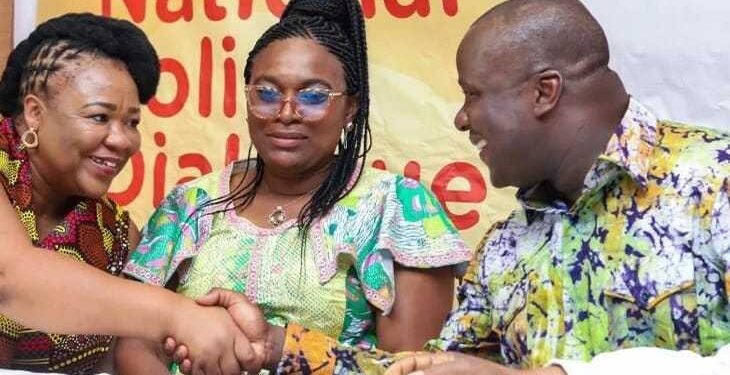Speaking at a National Policy Dialogue organized by Women in Mining Ghana, in Accra on Thursday, March 21, the Minister for Lands and Natural Resources, Samuel Abu Jinapor, has expressed government’s unwavering commitment to partnering with Women in Mining Ghana and stakeholders across the industry to drive meaningful changes for a more inclusive and prosperous mining sector which is fit for purpose.
Addressing the theme of ‘Diversity, Inclusion, and Belonging: Actions for the Mining Sector’, Mr Abu Jinapor underscored the importance of investing in women’s empowerment, aligning with the recent International Women’s Day celebrations.
Highlighting Ghana’s rich mining history and its pivotal role in the national economy, the Lands Minister emphasized the government’s vision to position Ghana as the primary hub of Africa’s mining activities.
He stressed the significance of inclusivity and justice in broadening participation in the industry, applauding Women in Mining Ghana for its advocacy efforts and commitment to core industry values.
Regarding economic empowerment, he pointed out the substantial contributions of women to the mining sector, citing examples of local content initiatives such as catering services, which generates significant revenue, as much as $2 million and over.
He emphasized the importance of creating opportunities for women to participate in all aspects of the industry, especially in the ranks of administration, from entry-level positions to leadership roles, highlighting the need for training and education support in fields like geology and chemical engineering.
“So I charge the Women in Mining to pay particular attention to training because Part of inclusion is training and educating the women to become part of the process from the very beginning. Taking relevant programmes that will make them qualified from the word go so that there is no reason not to include them.”
Expressing determination to align government policies with the needs of women in mining, the Damongo Member of Parliament called for collaborative efforts to enhance inclusivity and promote women’s success in the sector.
“There is the need to come together to twick polices and practices that promote gender equality, creating opportunities for women to advance in their careers, and fostering a culture of respect and inclusivity within mining companies,” he added.
The Minister, in his statement, reaffirmed the Ministry’s commitment to fostering an environment conducive to women’s advancement, echoing the sentiment that when women succeed, the nation prospers.
The Chairman of the occasion, Mrs. Judy Nakuor Crayem, CEO of Rapport Services and Member of the Board of the Minerals Commission, in addressing the state of women in artisanal mining, noted that although women constitute 50 percent of labour in the mining sector, they are left out in critical decision making in the industry.
She affirmed that challenges faced by women can be dealt with by providing a level playing field without discrimination for all women in the sector.
Mrs. Crayem announced that WIM in partnership with Ghana National Association of Small-Scale mining (GNASSM) is offering women other avenues for training in jewellery making and lapidary as an alternative livelihood and also as a way to address the lagging issues in the mining industry.
The President of Women in Mining, Ghana, Mrs. Georgette Barnes Sakyi-Addo, in her welcome statement, explained that subsequent to significant researches made, aimed at shining light on the realities faced by women in the mining sector, challenges such as access to information, financial resources, and inadequate policies to support active involvement have been identified.
The President continued that the policy dialogue is not just to acknowledge the challenges, but to focus on actionable solutions.
She called on all stakeholders and participants to take the agenda of diversity, inclusion and belonging forward, not just within borders but to the broader African Union and ECOWAS.
“Let us make this a collective effort, a united stand for a more inclusive and prosperous mining sector.”
There were also solidarity messages given by other Presidents of Women in Mining Africa from Congo, Niger, Nigeria and Namibia.


